After joining The Real World by Andrew Tate, you can join the Copywriting Campus. Professor Andrew (not Tate) teaches the course, which includes 14 key lessons with several training videos in each one. You learn everything from how people think, how to write short & long form copy, how to write cold emails, how to run sales calls, and more.
Copywriting has its setup backs because your income is not stable long-term unless you land several copywriting projects.
We'll discuss the following topics in this article.
- 5 challenges copywriters face in their industry
- What you learn in each of the 14 lessons within this campus
- If copywriting is worth getting into in 2024.
Finally, I'll touch on how you can use copywriting for your own benefit with the local lead generation business model.
Top 5 Copywriting Challenges
1. High Competition
An enormous challenge you'll have to face is that you're competing with thousands of copywriters from all around the world. If you look at freelance websites like UpWork or Freelancer, you'll see how much competition you're up against, which can make it difficult for you to land copywriting gigs. If you're patient enough and stay consistent in your prospecting, you'll eventually land clients and, over time, grow your portfolio, which will help you close more deals.
2. Writer's Block
Another challenge you may deal with is writer's block. There will be times where words just don't come to you and you can't find inspiration from anything. A reason for this can be because you simply aren't familiar with a certain topic or niche. This can cause you to not reach deadlines and eventually lose clients. To avoid this, do your research on specific topics before you take on a new client and write for them. If you do, your writing will sound like it's coming from an educated, authoritative source. As a result, your clients will be happy because your copy is providing them with results and they will want to continue giving you more work.
3. Difficult Clients
With making money online, not all clients are easy to work with. You'll face many who are difficult in that they want you to write a certain way even though they are hiring you to write their ads, or website content, etc. Creative differences can be highly frustrating. If you're always having to rewrite the content you wrote because your client wants things a certain way, you're going to lose out on time that you can invest in working on other projects, which can be frustrating. Find the time to make any changes your clients want as soon as they request them if you want to keep them happy and actually like working with them.
4. Payment Issues
Sometimes, clients can take their time paying you after you've sent an invoice for your services. Payment procrastination can set you back if you don't have your finances in order. Even if you are fine financially, it can annoy you to get paid later than expected. Therefore, it's important to make payment terms clear from the beginning and if you can automate payments, do so to save yourself from unnecessary frustration. Professor Andrew from the Real World recommends you agree on 50% of the payment upfront and the rest upon completion of the project, even if there are changes that need to be made.
5. Staying Disciplined
As a copywriter, you're mostly working by yourself in your own home or office. If you're in your own space, you need to make sure you stay disciplined with your time. If you get lazy and start waking up later in the day, you'll find that the day can fly by without you having accomplished anything. You'll be working into the evening, which won't leave you any time to yourself. This can affect how productive you are and it can affect the quality of the work you're getting done for your clients. To avoid not being productive, create a schedule that works for you and stick to it.
Copywriting Campus Breakdown (10 Stages)
1. What is Copywriting?
In the first video lesson of Stage 1, Professor Andrew talks about what copywriting is, what your role as a copywriter is, and gives you an overview of what you can expect to learn in this campus.
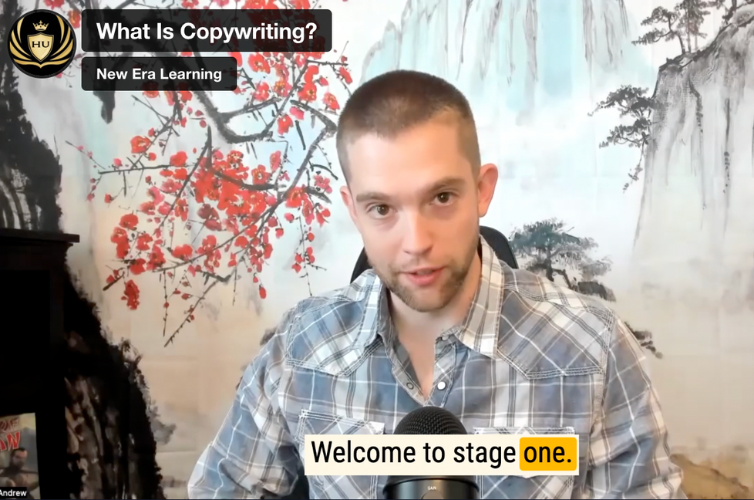
2. Copywriting Campus Core Values
In this lesson, Andrew explains what core values you should instill in yourself as you go through this campus. He talks about how you need to pay the price for the success you want, which takes a lot of self-reflection.
Andrew also highlights the OODA Loop. It's a concept developed by Colonel John Boyd that he used to defeat any fighter pilot in under 42 seconds.
OODA stands for...
- Observe
- Oriente
- Decide
- Act
The Colonel said that if you go through this process faster than your opponent, you'll always win. This process will help you always make adjustments with your work as a copywriter to become the best you can be. Andrew says that whenever you face a problem, come up with an idea, act on it and make changes based on the feedback to improve.
Another core value he shares is to hold yourself to a higher standard than anyone else.
The last core value is the "Top G Work Ethic", "When I am awake, I am working."
This means that you need to outwork everyone else so that you can achieve the life you want to live. According to Andrew, the students who are successful are the ones who apply all 4 core values.
3. How to Accelerate Your Ability to Learn & Work
Andrews' key to speeding up your ability to learn and work is to simply put your phone away to not be distracted. He says to do it for 15 minutes per day. The goal is to each 90 minutes of time away from your phone to avoid distractions.
Andrew calls it G-Work Sessions. The more you stay focused the more money you'll make.
4. How to Ask Questions
When it comes to asking questions within the program, Andrew encourages you to solve the problem yourself first. If you've exhausted all your options, then you can go into the program and ask a smart question that includes context about what you've already done and what you think the answer is.
5. Why You Should Do More Pushups
Andrew literally says that the more pushups you do, the more money you make as a copywriter. He says to mix in a few pushups (100 per day) in your work routine throughout the day to keep your mind fresh.
Other Resources Andrew Shares
- Daily Power Up Calls for motivation on the Rumble video platform
- Link to binaural beats you can listen to on the Rumble platform
- Free PDF guide: 10 Tips to Become a $10K Copywriter As Fast as Possible
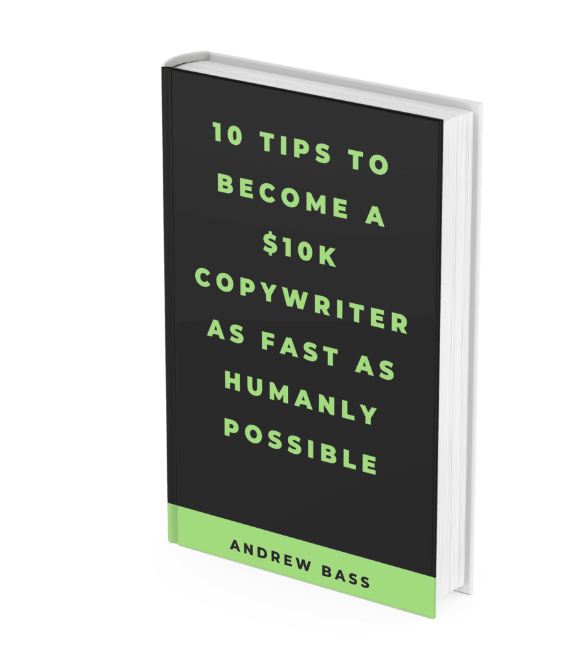
Your First Mission
The first task that Andrew has you do is to set a timer for 15 minutes and read a sales page. He wants you to see how the writer is trying to influence the reader.
1. Understand How People Work
This first video is a short intro of what you're going to learn in this stage.
2. Target Markets & Avatars
In lesson 2, Andrew says that the first step in understanding people and preparing yourself as a copywriter to help people is to pick who you're reaching out to and who you're helping. This lesson helps you think about who your target market is before you make any money online.
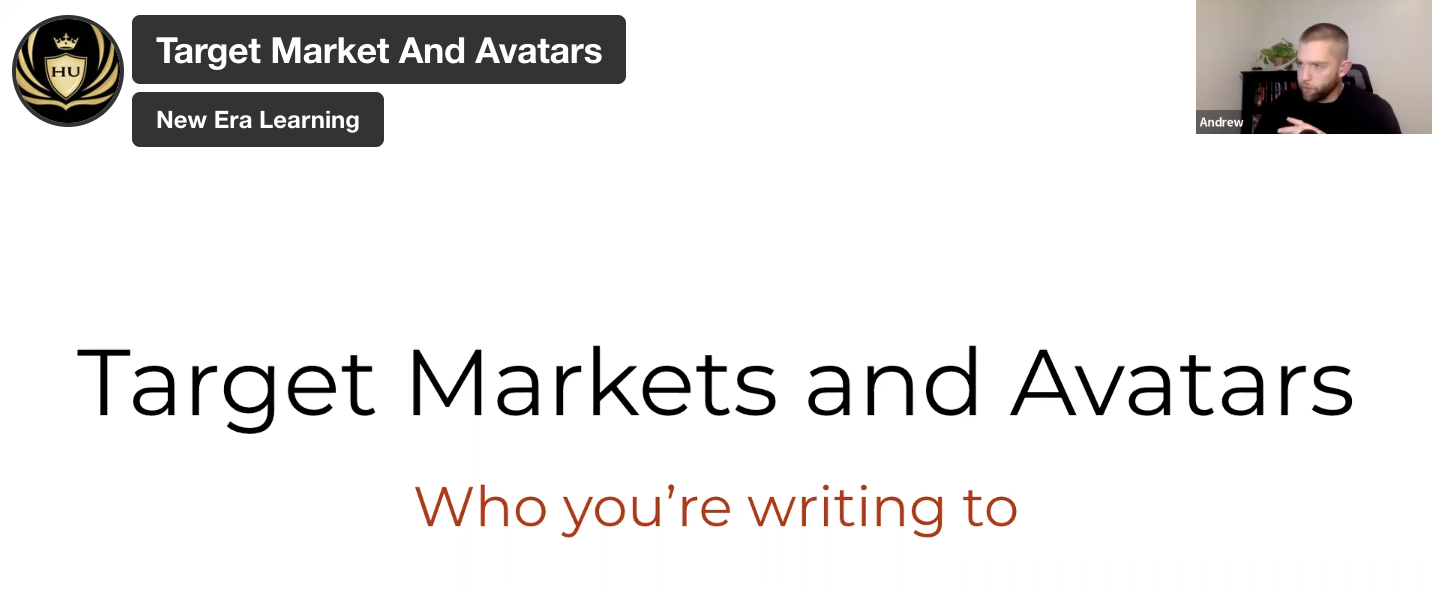
3. Human Motivators
In lesson 3, Andrew talks about what human motivators are and emphasizes the importance of using them for good instead of evil. He mentions two things that copywriters need to understand for why people are compelled to take action.
- They're running away from pain
- They're running towards pleasure
By understanding these, you'll know how to propel people forward to a better life through your copywriting.
4. The Path to Change
In this lesson, you learn how to direct a motivated person to change.
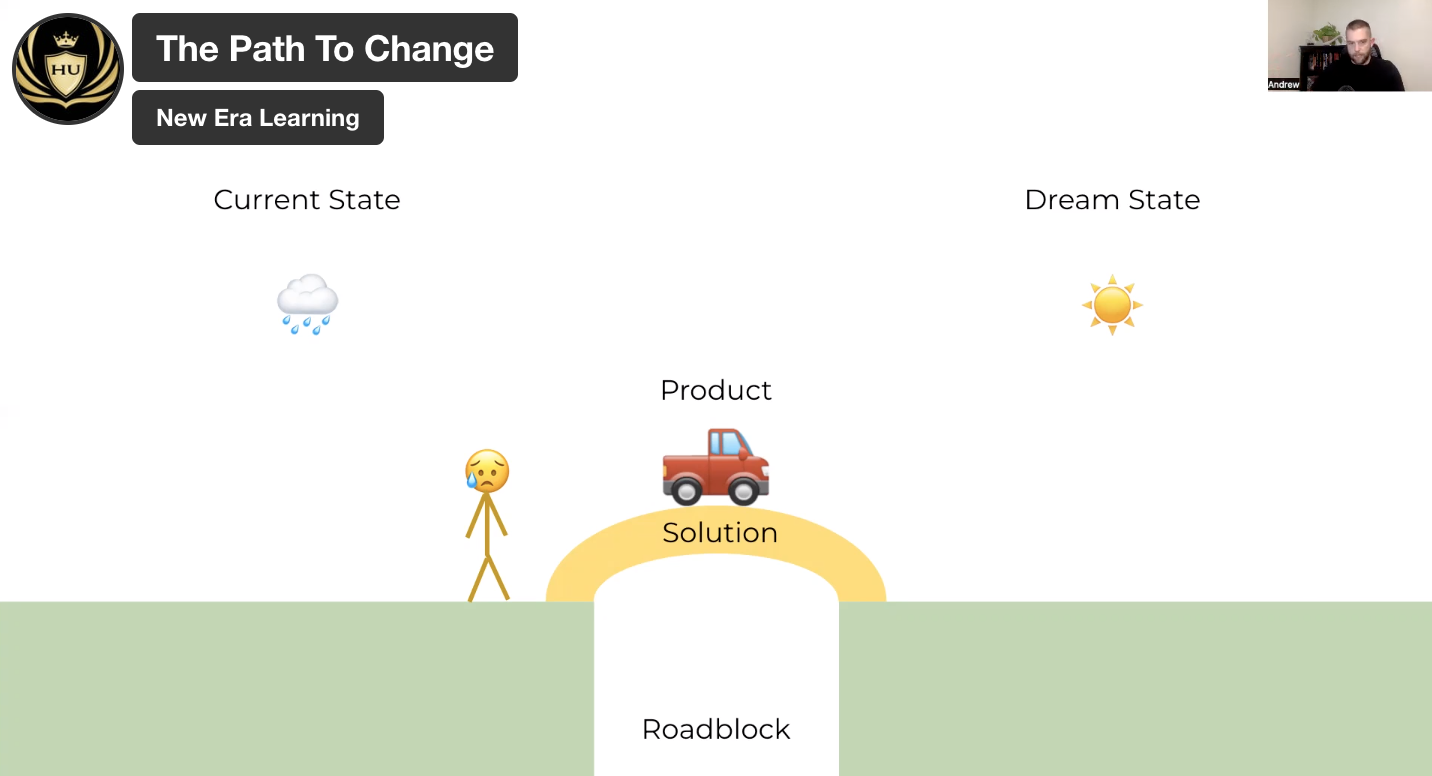
Bonus: Time Management 101
The last lesson is a bonus. Andrew calls it a crash course on how to invest in time the right way for maximum returns. He talks about a simple way of taking control of your time so that you can be highly productive.
To determine what it is you need to do each day, he recommends you implement the "Eisenhower Matrix".
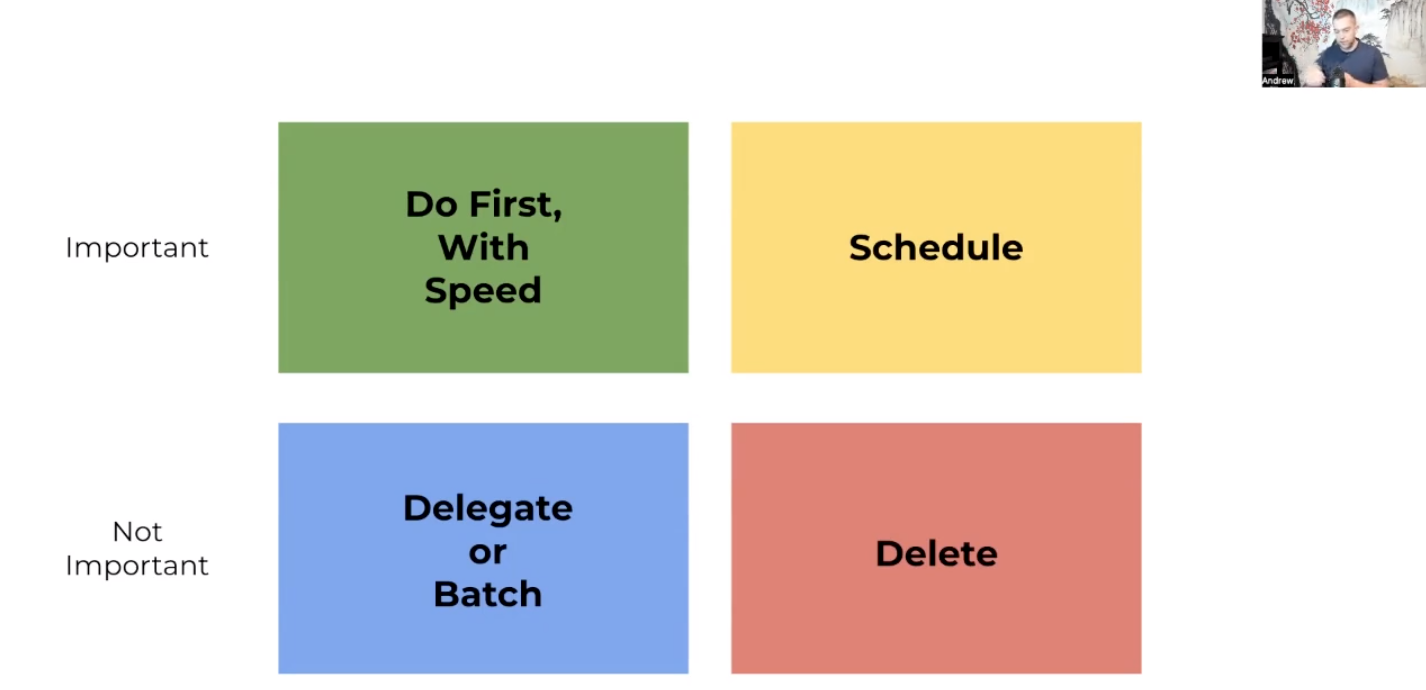
1. Business 101
In the first lesson of Stage 3, Andrew talks about why people will give you their hard earned money. He gets you to think about why you give your money to someone else.
You'll realize that although you want money, you also have to help your prospect and provide them with something valuable. The more value you can give to another business, the more money you'll make.
2. The Value Equation
In lesson 2, Andrew talks about how people perceive value and explains the concept of The Value Equation by Alex Hormozi. Hormozi came up with a formula that is useful for copywriters to help you understand which emotional lever to pull to help increase the value someone perceives in your product or service. It's up to you to change how someone perceives what you're offering.

3. Know, Like, and Trust
This lesson is all about getting your ideal customers or clients to know, like, and trust you. If you can accomplish this, you'll ensure that you're always going to be in business.
4. LTV and Scale
Andrews talks about two levers of success which are LTV (Lifetime Value) and Scale. These two factors will determine how much money a business will make. LTV is determined by how much money a customer will make you and the number of customers you have determines how much you scale your business.
5. The Value Ladder
In the last lesson of Stage 3, Andrew talks about what you can do to maximize the LTV of your customers.
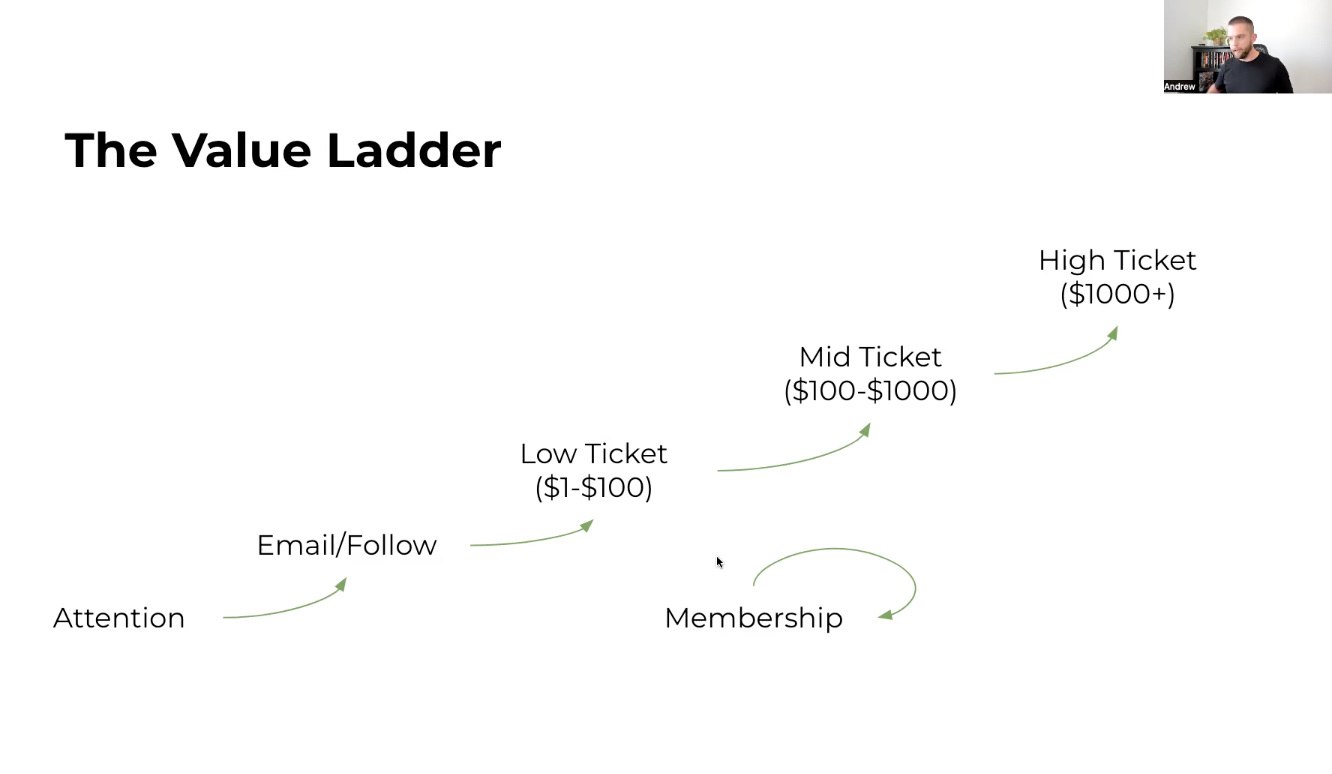
1. Research
This entire section is all about research. Andrew says that this is an important skill that will set you apart from every other copywriter. He says that research is the mark of a professional copywriter because if you don't do it, your writing won't be effective. When you do your research, you're then be able to intelligently write to your customers.
He mentions some things to look for when doing research...
- Determine who your target market is
- Create your avatar and find out who you're writing
- Understanding the current state of your avatar
- Understand their dream state
- What are their roadblocks?
- What action they need to take to overcome the key roadblock
- You need to understand how your product helps them reach their solution
Andrew also shares a few places you can go to find out all the above points such as...
- Clients
- Social Media
- Quora
- Google etc.
2. Research Walkthrough
In this 31 minute video, you watch Andrew do an actual walkthrough of him doing research.
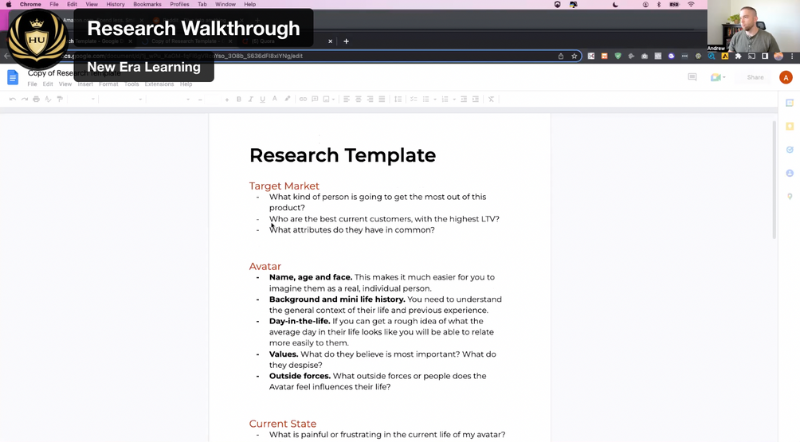
1. Weaponizing Attention & Curiosity
They geared the first lesson in Stage 5 towards teaching you actionable steps you can take to grab your audience's attention and increase their curiosity by what you write.
2. How to Write Fascinations
Andrew talks about what fascinations are and how to write them. Some formulas he mentions you can use to write winning fascinations that attract people's attention are...
- How to...
- What never...
- Why...
- Numbers...
- Gimmick...
- Warning...
- Are you?...
You can use these in email subject lines, blog titles, Facebook ads, and more.
3. The Creative Thinking Process
This lesson teaches you how to come up with ideas that disrupt entire markets by what you write.
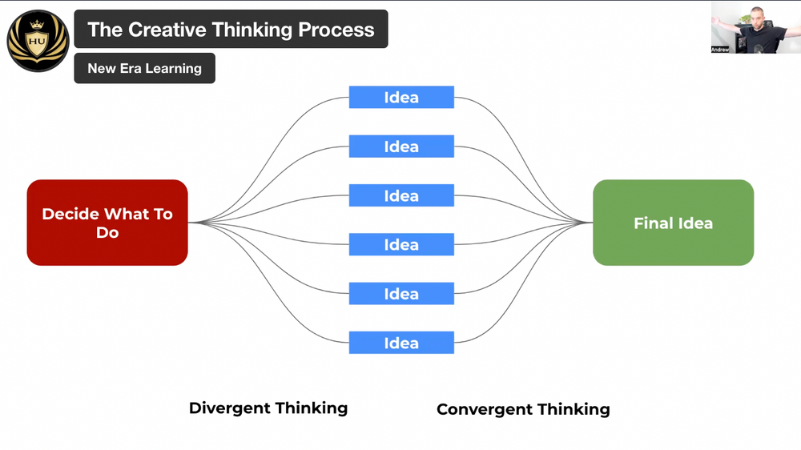
4. How to Evaluate & Improve Your Writing
In this lesson, Andrew shows you the process he goes through to help you improve your writing.
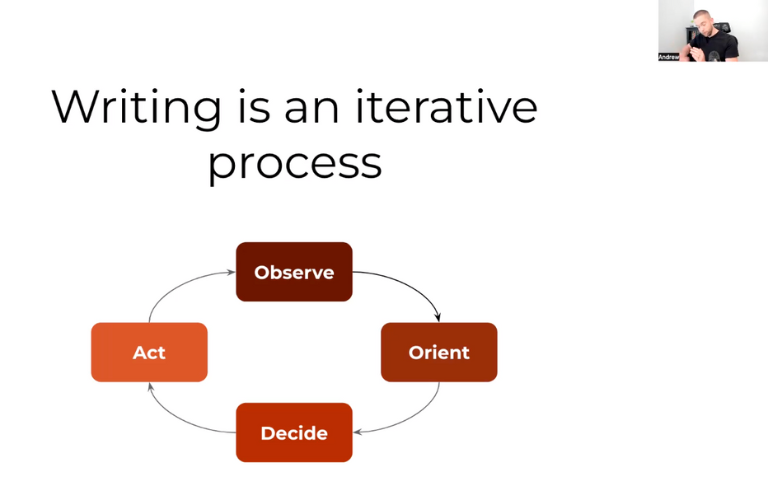
The steps he goes through to see if he needs to make any adjustments in his copy are...
- Read your copy out loud
- Imagine how the avatar will perceive the writing
- Grammar and spelling check
If you want to make good money online, these steps are necessary.
1. What is Short Form Copy?
In this short video, Andrew explains what short form copy is. Its purpose is to "sell the click". This copy gets the reader to go to the place where they will be sold like a sales page.
2. DIC Framework
In this video, you're shown what DIC framework is, and its purpose in copywriting.
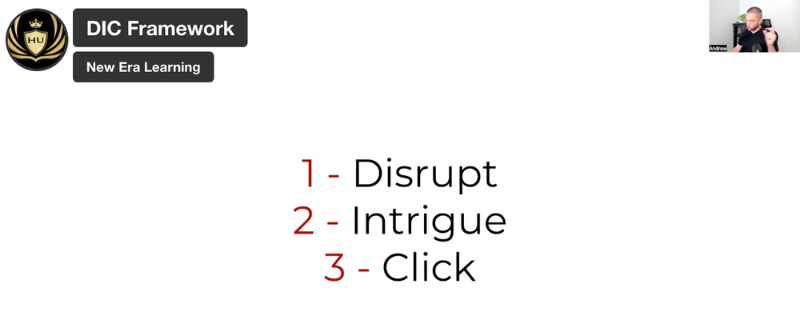
He then gives examples of what DIC copy looks like.
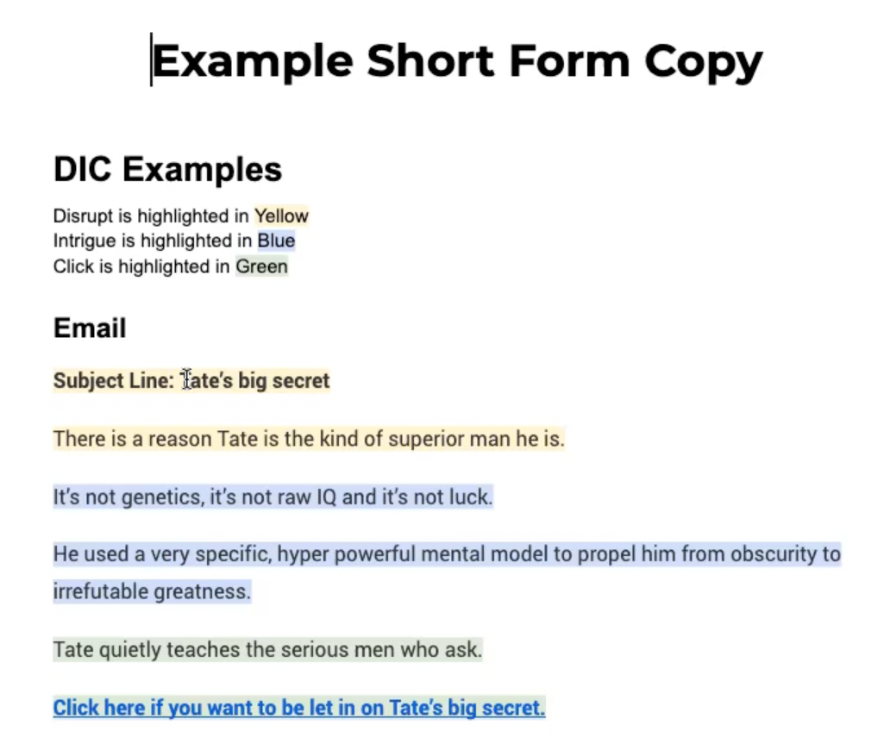
3. PAS Framework
Andrew says that the PAS framework is all about triggering mass emotional motivation to take action.
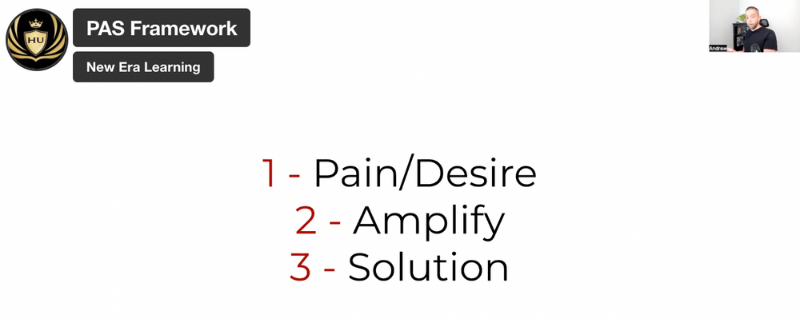
Andrew also gives examples of PAS copy.
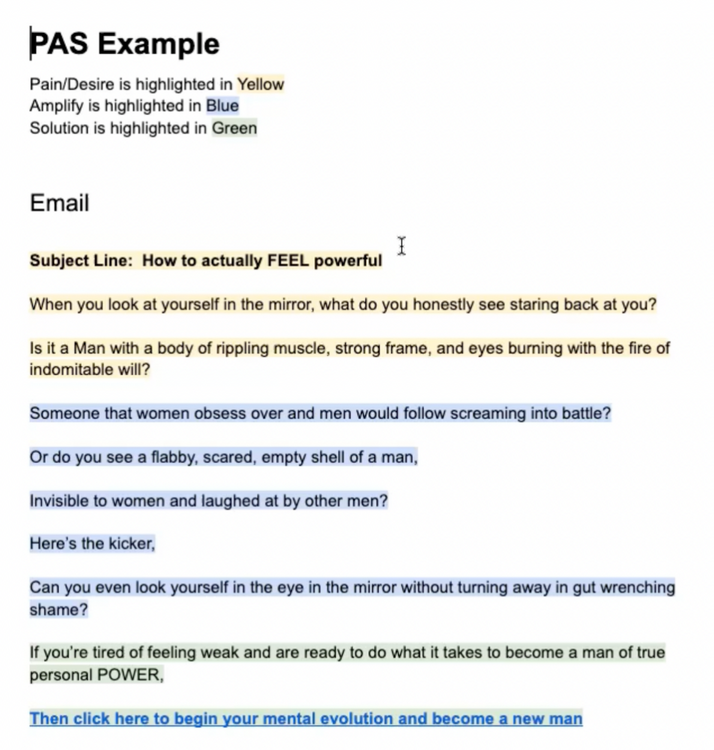
4. HSO Framwork
In lesson 4, Andrew speaks on how the HSO framework is all about shifting belief and inspiring desire through the use of a story.
HSO stands for...
- Hook
- Story
- Offer
Andrew then shares examples of HSO copy.
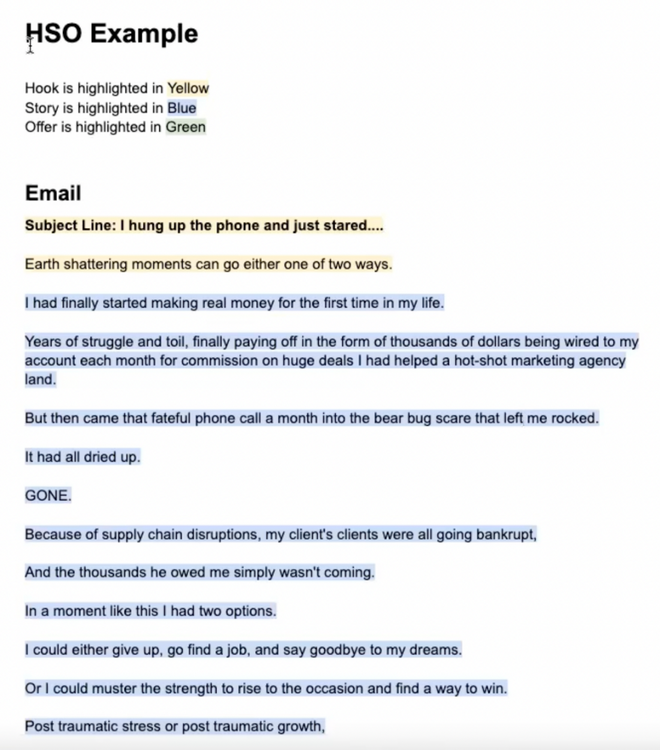
5. Short Form Copy Best Practices
In the last lesson of Stage 6, Andrew touches on some things you should keep in mind when writing short form copy so that your readers can enjoy and find your words valuable.
1. How to Model Successful Copy
In the first lesson of Stage 7, Andrew talks about why and how you should model your copywriting with what's already working on the market.
2. What are Opt-In Pages?
Andrew explains what opt in pages are and shows several examples of what good opt in pages look like with good headlines and copy to help get you thinking on how to craft your own opt in pages.
1. How to Write Email Sequences
Andrew now talks about how you can write email sequences to help make money for a company. These strategies can even be used on other communication platforms like social media, SMS, etc.
1. What is Long Form Copy?
Andrew gives you an introduction to what long form copy is and why it's important.
2. Long Form Copy Outline
In this video, Andrew gives you an outline of what long form copy looks like on a sales page.
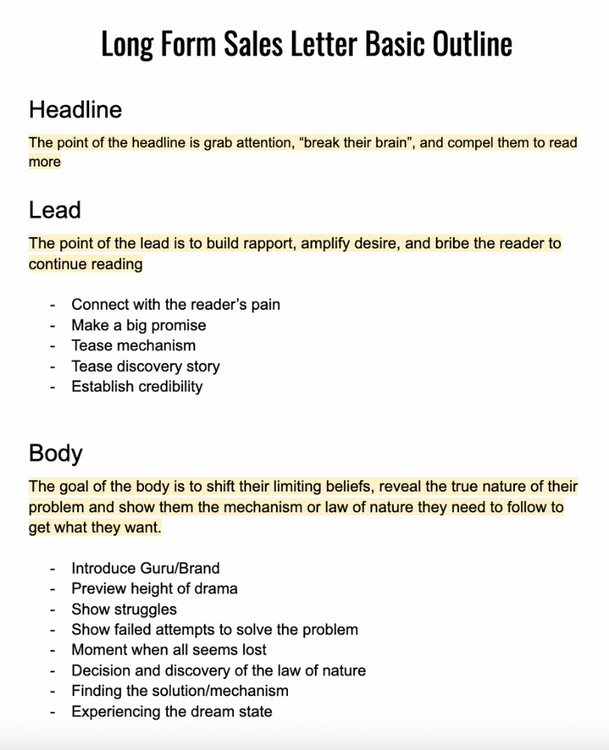
1. The Goal of Prospecting
The first video is just an introduction to what you're going to learn in this stage.
2. What Makes a Good Prospect?
Andrew talks about what makes a business a good prospect for you to turn into a client.
A few things he mentions are that they...
- Have to have money
- Have to be in pain
- Have to sell high margin products/services online
- Must have an audience
3. The Buying Window
Andrew talks about the idea of "The Buying Window". Simply put, 5-10% of your prospects are actively looking for something to improve their online marketing. Your job is to put yourself in front of those business owners and not waste your time with people who aren't in the buying window.
4. Niches & Finding Prospects
Andrew now shares the top niches to look for clients.
- Health
- Relationships
- Wealth
He then recommends that you narrow down those categories and look for sub niches you can write for.
Bonus: Good Local Business Clients
Andrew gives advice on which local business you can also go after, such as dentists, chiropractors and gyms. For those types of businesses, you can set up Facebook ad campaigns, improve their websites and social media accounts.
1. The Hunting Mindset
To start of Stage 11, Andrew wants you to implement this type of mindset, which will help you close deals with business owners.
2. Setting Up Your Spreadsheet
This lesson is all about staying organized in your prospecting process using Google Sheets. Andrew also shares a Google Sheet you can use to help you when prospecting.

3-8. Finding Prospects
Over several training videos, Andrew shows you how to find prospects on platforms like...
- YouTube
- TikTok
- Yelp
- Google Maps
9. Finding Email Addresses
Andrew shares tips on where you can find business owner email addresses.
Some things you can use or places you can go are...
- Business website contact page
- Hunter.io
- Facebook business page
- YouTube About page
- Instagram page
10. How to Prospect Much Faster
This last lesson is where Andrew talks about what you can do to prospect at a faster rate to increase the number of deals you close.
1. What they should FEEL
The highlight of this section is that your audience should feel as if you are peers with them when you are sending cold emails instead of sounding like a marketer.
2. Different Cold Outreach Email Strategies
In this lesson, Andrew shows you several cold outreach email strategies and recommends you stick with one strategy for some time before switching to a different one.
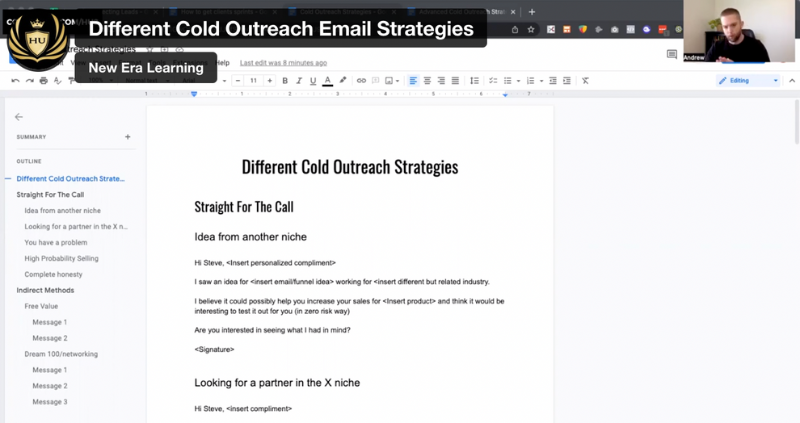
3. The Importance of Making your Outreach Unique to You
Although Andrew gave you a few templates for you to use, you still need to personalize them to you, your client, the niche, and the market. He emphasizes the importance of being unique.
4. Testing Plan
Your first email template may not work. Therefore it's vital you test different aspects of the email, such as the subject line, body, call to action, and more. If you don't do any testing, you won't find the formula for success.
5. How to Create Winning Subject Lines
In lesson 5, Andrew shows you how you can create subject lines that are going to convert prospects into paying clients.
6. How to Create Winning Email Body Messages
This lesson is where you learn how to create the body of an email in a way that is going to provide positive results.
7. Compliments
The last lesson in stage 12 is where you learn about the importance and effect of leaving compliments for your prospects. Andrew talks about how you can best compliment them to capture their attention and not make them immediately classify you as a spammy marketer.
Streak CRM
Andrew shows you how to get setup with Streak CRM so to that you can send cold email campaigns and also shows you how to send emails.
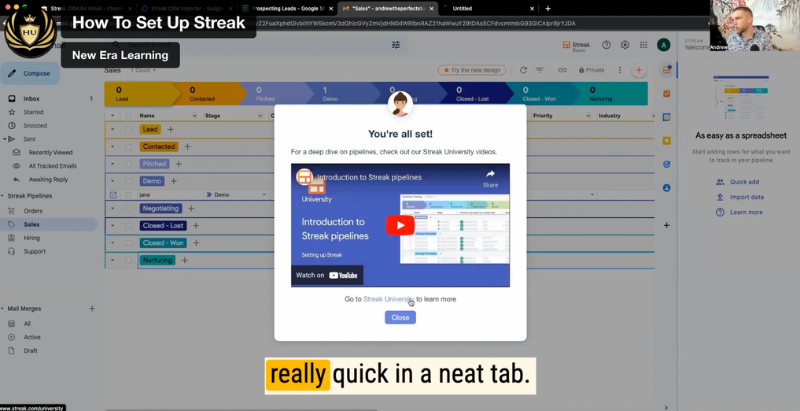
You'll then learn how to follow-up with your email list, why doing so is vital to your success, and how to set up a call if they reply back.
1. Trust, Belief, and Desperation
Now, Andrew talks about how to run sales calls and how to turn them into clients who pay you thousands of dollars each month. In this video lesson, Andrew touches on how you need to build trust and belief in your prospect's mind. This is accomplished by first getting to know each other and having a normal conversation for the first few minutes of the sales call without sounding desperate.
2. The "Doctor" Frame for Sales
Andrew says that you need to appear a doctor who is coming in to access your prospects' situation to see how you're going to help them. He says to never give a solution you think they need unless you've accessed the situation like an actual doctor does.
3. Using SPIN Questions
In lesson 3, Andrew shows you how to use questions to diagnose your prospects' problems.
4. Discovery Projects
After you've gone through your series of questions, Andrew tells you to pitch them on a discovery project. This is just a small part of the bigger solution you have for them. The goal is to build some trust with them.
5. How to Price your Services & Collect Money
Not everyone knows how to price their services or even how to collect money. That's why Andrew talks about how to go about doing so. Although he doesn't share a specific guide on how to price your services, he recommends you charge by the value of what you're providing and to never charge hourly, since that's for employees.
6. How to Practice & Get Good at Sales
Andrew shares some tips on what you can do to practice your sales skills. He shares some resources that will help you in this process.
BONUS: Discovery Call Breakdown & Review
This bonus lessons is a live coaching call Andrew did with some HU3 students. He does a discovery call breakdown of one student's sales call. They go over what he did and how he could have improved it.
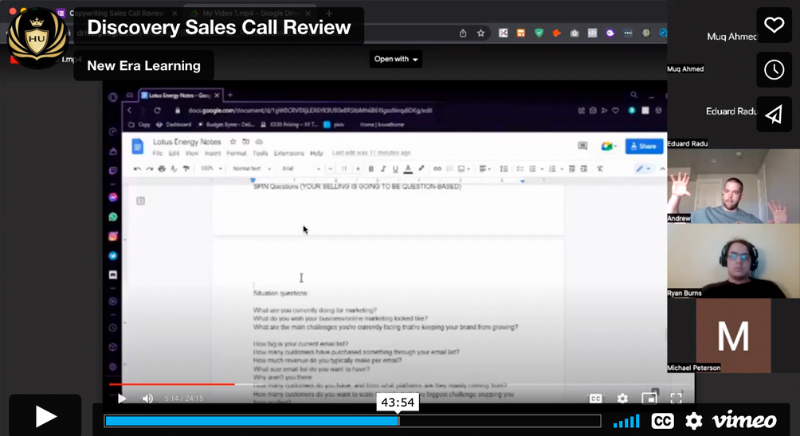
Is the Real World Copywriting Campus Worth it?
The Real World Copywriting Campus is worth it if you'd like to get an introduction into copywriting so that you can start making money online. Professor Andrew dives into the foundation and mindset of writing. He also shows you several examples of what he's talking about in each lesson. Although the Crypto Campus is one of the top courses within The Real World, the Copywriting Campus is another in-depth course that is still worth your time only if copywriting is something you want to get into.
After you're done going through the 14 lessons, you'll then be placed in a "legion" or copywriting group. This group isn't some kind of pyramid scheme and it has nothing to do with Andrew Tate's War Room.
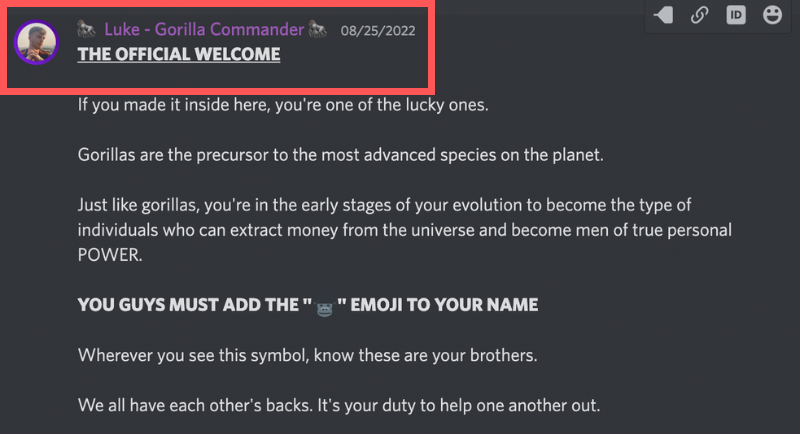
It's where you'll learn advanced writing techniques to fine tune your skills and get extra help after you've taken the online course.
The Real World Copywriting Alternative

Writing Your Way to Freedom by Sarah Turner is an online course that teaches you how to start a freelance copywriting business within 3 months. She touches on topics such as what mindset to have when getting started, how to write copy, how to land clients, how to onboard them, and more. There is SEO training and after joining, you get access to a private FB group.
Price: Writing Your Way to Freedom costs $1,999.
More Info: Writing Your Way to Freedom Review

Filthy Rich Writer by Nicki Krawczyk is an online resource ideal for new and aspiring copywriters. A professional copywriter for over 20 years, Nicki and her team teaches copywriting fundamentals to their students through the Comprehensive Copywriting Academy. They also have a student-only Facebook community and regular calls with expert coaches.
Price: Filthy Rich Writer costs $697 (one-time payment) or $257 (3-month payment plan). Contact them for updated details on costs and payment options.
More Info: Filthy Rich Writer review
Is Copywriting Worth it in 2024?
Copywriting is worth it in 2024 because we live in the digital age where copywriting is needed everywhere you look. Many businesses need copywriters to come in and write their paid ads, website copy, email marketing campaigns, SMS campaigns, and more. The way to make money online with copywriting is to know your avatar and use your words to convince them to do what you want them to do.
The problem with copywriting is that you will not earn a predictable income. You may take on several clients, but you don't know how long they will have work for you, plus they can stop working with you whenever they chose to. Therefore, you'll need to put a system in place where you're always prospecting for new clients and staying in contact with past ones you've done work for in case they have more work for you.
Copywriting clients can also demand a lot because they will want things a certain way, even though they hired you to do the job.
Of all the online business models you can choose from, copywriting is one that can make you decent money. According to PayScale, the average copywriter makes $54,935 per year. Some copywriters are even making 6-figures.
Copywriting, like Amazon FBA, dropshipping and affiliate marketing, is good, but it doesn't provide you with all the benefits that the local lead generation business model does.
Final Thoughts
The local lead generation business model allows you to make money online each month by generating leads and only forwarding them to a local small business who wants more work on a monthly basis.
My tree care website below is an example of a lead generation property that generates leads every month.

The insane part is that this site has been paying me $2000 every month ever since I built and ranked it over 7 years ago. Of course, copywriting played a role in me building out and ranking my site, but I'm using my copywriting skills for my benefit.
What makes this business model so great is that after you've done your part in building and ranking your sites, your job is practically done. Having your lead gen sites ranked at the top of the search results on Google in your local market will result in you generating leads. All you need to do is some light maintenance to make sure everything is up and running well.
Business owners are blown away when you send them leads consistently month after month, which is why they're happy to pay you on autopilot.
To learn how you can join the over 7400 students who are currently building out their digital real estate to continue earning a passive income, check out the local lead generation training program.


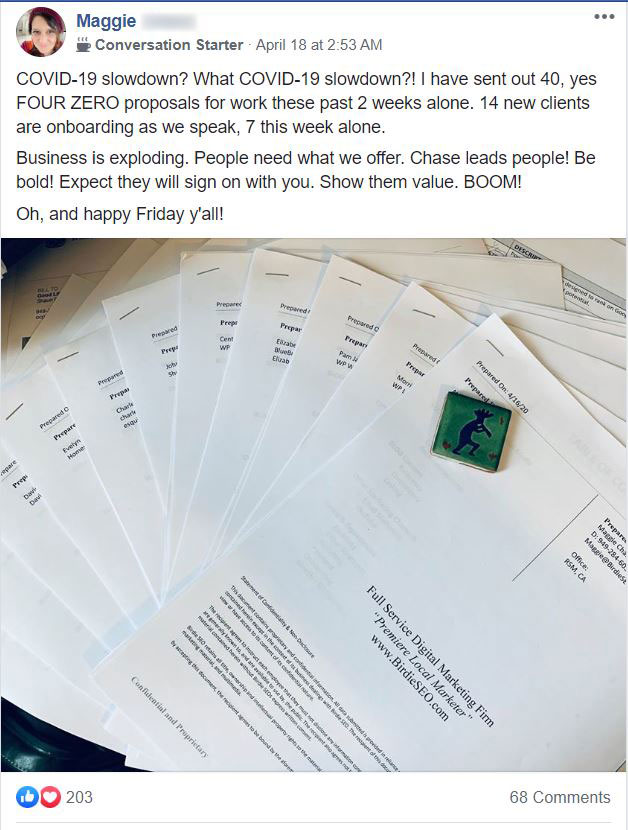
Do you have the research template Docs link?
You can check out everything in the module section on Andrew Tate’s website.